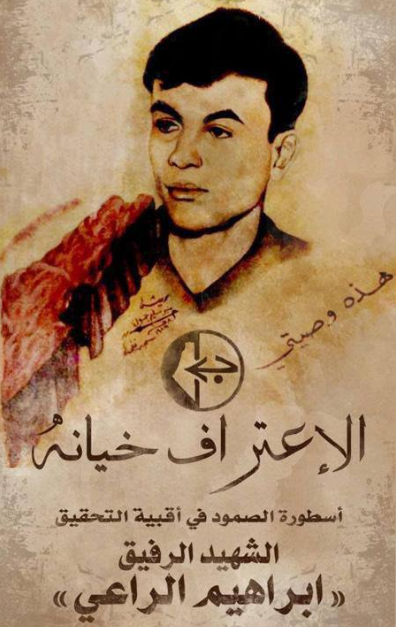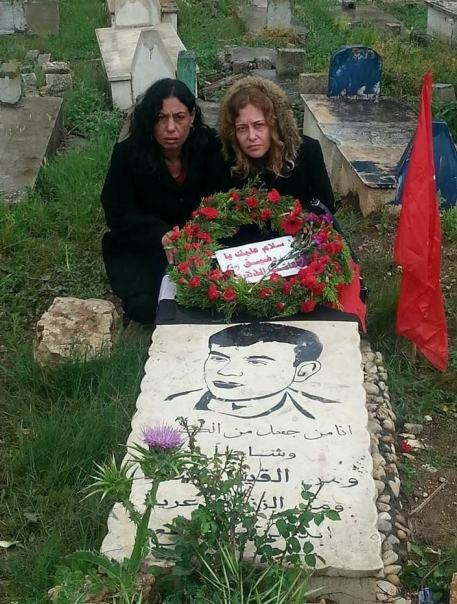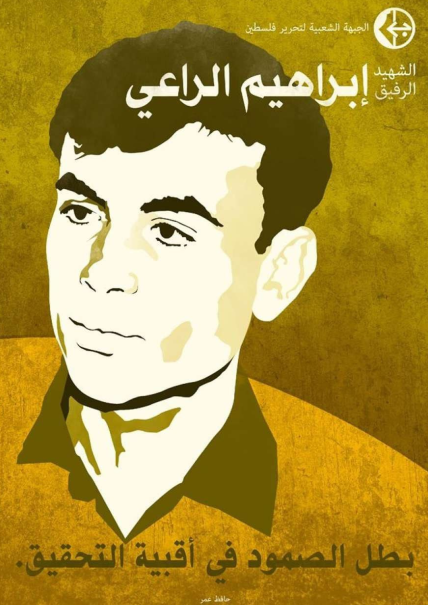
Abu Al-Muntasir. The nickname means victorious in Arabic. Indeed, he was.Today, we honor the memory of the legend of the prisoners, he who exemplified the pinnacle of steadfastness and bravery: the martyred comrade and prisoner Ibrahim Al-Ra’i.The young fighter was born in 1960 in Qalqilya. He soon joined the Popular Front for the Liberation of Palestine. In 1978 he was arrested at the age of 18. For four months he was interrogated. He never confessed, saying “confession is betrayal.” The zionists sentenced him to five and a half years on charges that he never confessed to.
In the revolutionary schools of the prisons, he wrote and lectured to the other prisoners. In the 1980s, he was released along with other prisoners as part of a zionist deal to form a normalizing alternative to the PLO with some traitors in Palestinian villages. Ibrahim refused the idea behind this deal, claiming that he would not take his freedom at the expense of collaboration. These villages represented themselves only, and he believed in the representation of the PLO. Thus, he was re-arrested by the IOF.
Following his freedom, he returned to his studies, joining Al-Najah University where he founded and led the PFLP student bloc. As a writer and intellectual, he influenced, organized, and wrote. Again, zionists rearrested him in 1986, on charges that he killed settlers in resistance operations. For two months he was tortured. Once again, he did not confess. This time, his sentence was seven and a half years.
Chants were formed on the basis of this hero: “Steadfast, steadfast, O comrade! Like Al-Ra’i during interrogation!” His will was unbreakable.
From the prisons, he continued to lead. After a year and a half of his second sentence, rumors claimed that a group of fighters accused of killing IOF soldiers confessed that Al-Ra’i issued orders from within the prisons to kill the mayor of Nablus, who the PFLP saw as a collaborator. He was transferred to Nablus prison for more interrogation.
Yet again, he did not confess. Confession is betrayal. He was transferred yet again to Moscobiya prison. Tortured, beaten, and abused, the steadfast hero began a hunger strike. The IOF arrested his sister in an attempt to get him to confess. He refused. In February 1988, he was transferred to Ramle prison to be held in solitary confinement: he was not allowed to bathe, shave, or change clothes. He did not confess. Confession is betrayal.
On the walls of the prison during his solitary confinement, he engraved his immortal words, “My comrades, they may hang me, and it is possible. If they hang me, they will not kill me. I will remain alive, defying them, and I will not die. Remember me, I will stay alive and in your hearts as your pulse.
Believe me, my comrades, I have not fallen. They fell due to their misery, and fatigue has worn them out.”
Today, 35 years ago, Ibrahim was martyred in the very cell where these words are engraved, after years of heroic struggle, inspiring a generation of heroic prisoners who undertake hunger strikes like the hero Khader Adnan, who use their bodies as weapons against the oppressive zionist jailer.
The IOF claimed that he committed suicide, but after his body was handed over, his body showed signs of obvious torture: a swollen head, skin black and blue, a broken jaw, stitches, signs of choking, and bleeding ears. The depraved zionist entity hung him even after his martyrdom.
Nine years after his martyrdom, his sister Sana carried out a shooting operation against IOF soldiers near the Jordan River Bridge, later arrested and sentenced to 22 years.
We remember Ibrahim and his immortal words: “Those who disclose war secrets are criminals, and those who kneel before enemies are criminals.
Direct your gaze towards the enemy and advance. Advance. Victory is ours.”


—
Today, April 11, 1988, marks the anniversary of the assassination of the martyr comrade Ibrahim Al-Rai, who taught us that “confession is betrayal.”A legend of steadfastness in the interrogation cellars, he was martyred under torture after refusing to confess to any information, always upholding the motto “confession is betrayal.”The feat of steadfastness until martyrdom, inscribed by comrade Ibrahim Al-Rai in the interrogation cellars, has turned into a doctrine and a path for prisoners after him and formed a revolutionary model that the enemy’s defeat within the depths of its cells is possible, indeed a necessity and an act of high-caliber revolution.
Martyr Ibrahim Al-Rai wrote in his will from inside the “Ramla” prison: “I have studied revolutionary science and learned that the contradiction between us and the enemies is a clash that cannot be resolved except by the end of one of the opposites, as I learned that each of the opposites will work hard to eliminate the other and end it.
Based on this scientific logic, as long as the enemy has not worked to eliminate me, this means that I still do not represent a natural part of its main opposite.”
Comrade Ibrahim Al-Rai wanted a life worth the sacrificial death for it.
May your memory live eternally.
